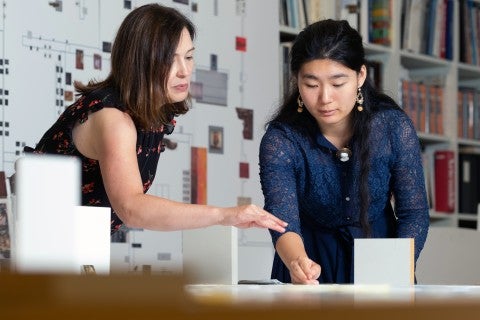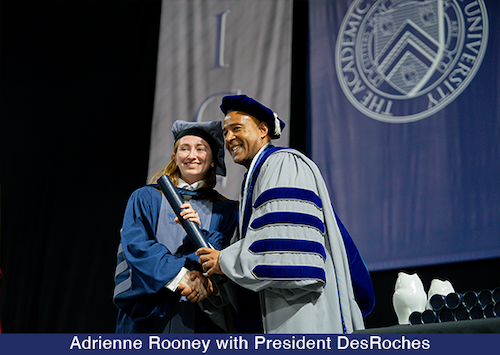
The humanities at Rice are advancing.
- This year, we welcome 15 new tenure-track faculty members to the school, each of whom will bring innovative inquiry and research excellence to Rice;
- We’re rising quite literally from the ground, as we celebrated the groundbreaking of our much-anticipated new home for the Department of Art, Susan and Fayez Sarofim Hall;
- We’re rising to meet student demand, whether for our art, creative writing and language courses or our popular minors in Medical Humanities; Politics, Law and Social Thought; and Environmental Studies;
- We’re expanding our research in the fields of medical humanities and environmental studies and on the cultures and histories of Latin American and Latinx communities — thanks to the university’s investments in the new Medical Humanities Research Institute and the new centers for Environmental Studies and Latin American and Latinx Studies.
Our aim is nothing less than becoming a national leader in humanities and arts innovation and high-impact research and teaching that empowers our students to engage and change the world. As we look back on this year, I am proud of our advances and optimistic for the future of our school — and the impact of our work in our classrooms, in the nearby communities and the world beyond.
INVESTING IN THE CREATIVE ARTS
Sarofim Hall
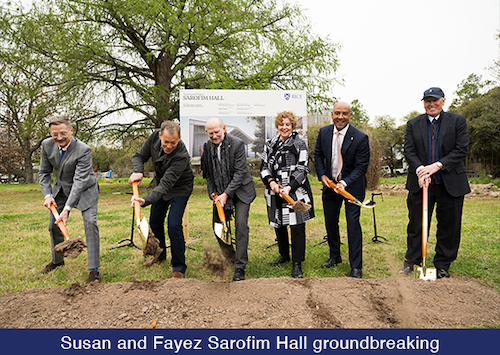
“Let the ground be broken, so the mold can be broken.”
With these words from alumnus and architect Charles Renfro '87, '89, of the firm Diller Scofidio + Renfro, we broke ground in February on the new home for the Department of Art. Susan and Fayez Sarofim Hall, slated to open in fall 2025, is a wonderful fulfillment of a strategic vision of excellence, ambition and aspiration. This is evident in every aspect of the building’s design, thanks to Charles and his team, who served as architect-ethnographers, living and listening among our faculty and students in studios, film and photography labs, and performance spaces to create a facility that befits a top-ranked research university — and promises to take Rice to a new level of excellence in arts education and innovation
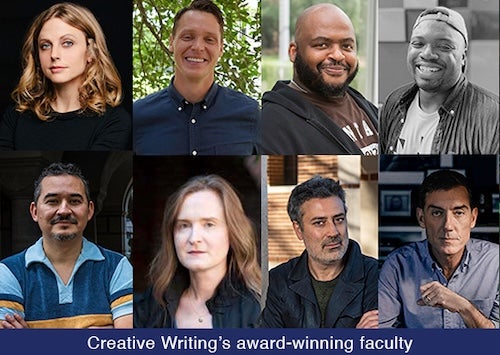
Creative Writing
“We want to be the best undergraduate creative writing program in the country,” says Justin Cronin, Department of English writer-in-residence and author of the bestselling The Passage trilogy and The Ferryman. “Students apply to a university for a thing, and we want to be that thing.” See Rice News and learn about the dazzling rise of Creative Writing, its deep bench of award-winning faculty and the program’s new ambitions, including plans to develop a Master of Fine Arts (MFA) in Creative Writing at Rice.
CULTIVATING THE CONNECTIVE HUMANITIES
Our pursuit of the connective humanities at Rice has garnered attention during our recent Humanities Innovations events in Palo Alto, Washington, D.C., and New York. Our candidates for faculty positions have asked us to elaborate on what this term means in practice. A distinctive feature of our school today, connective humanities recognizes the significance of the humanities in many arenas where humanities have not traditionally had a presence or a voice — at Rice and beyond. It marks the importance of interdisciplinary conversations and collaborations that enhance the visibility of the humanities and the arts at Rice, and deepen the connections for our students between our classrooms and studios and the realms of experience beyond the university.
See Rice News to learn more about the idea behind and the people who are helping to drive this connective ambition.
DEEPENING HUMANITIES RESEARCH
We are thrilled to see Rice deepen its investment in humanities research. In fall 2023, the Medical Humanities Research Institute was among five research institutes to receive initial Rice funding. Now, two Humanities-based centers, the Center for Environmental Studies and the new Center for Latin American and Latinx Studies, are among five research centers to receive support in the competition for center funding in early 2024.
We are grateful to our faculty who are leading these initiatives, including Kirsten Ostherr, the Gladys Louise Fox Professor of English and director of the Medical Humanities Research Institute and Program in Medical Humanities; Joseph Campana, the William Shakespeare Professor of English and director of the Center for Environmental Studies; and Sophie Esch, associate professor of Modern and Classical Literatures and Cultures, and Laura Correa Ochoa, assistant professor of History, for leading the Center for Latin American and Latinx Studies, along with Leslie Schwindt-Bayer, Edwards Professor of Political Science in the School of Social Sciences. We look forward to the catalytic impact these research hubs will have on research and teaching of our graduate and undergraduate students.
24-HOUR CHALLENGE
Many of you participated in Rice’s annual 24-Hour Challenge day of giving, and we thank you. We would especially like to thank lead Humanities Advisory Board donor John Eldridge ’75 and Annette Eldridge, who along with members Emily Todd ’88 and Troy Williams ’94, enabled the Humanities Advisory Board to offer a $15,000 challenge gift. Collectively our community of Humanities alumni, parents, faculty, staff and friends helped propel us beyond our $50,000 and 100-donor goal to raise more than $57,000 from 188 donors. Thank you to all who gave in support of our School of Humanities Excellence Fund!
EXPLORING THE BIG QUESTIONS
Our Big Questions course subjects vary wildly, but each class shares a common goal: inviting students from diverse academic backgrounds and career interests to experience how humanistic and artistic inquiry can help make sense of our world and the daily dilemmas we face. Anticipation is already building for the thought-provoking topics coming in fall 2024: “What Is Religion?,” taught by Jeffrey J. Kripal, the J. Newton Rayzor Professor in Philosophy and Religious Thought in the Department of Religion, and “What Is Home?,” taught by Claire Branigan, a lecturer in the Department of Modern and Classical Literatures and Cultures, and Stephen Sherman, a research scientist in the Kinder Institute for Urban Research.
EXTRA: Don’t miss a wonderful interview in The Conversation with Timothy Morton, the Rita Shea Guffey Chair of English, on what inspired a previous Big Questions course, “What is a Fact?”: “Students learn to look at the world with fresh, skeptical eyes. They learn to identify illogical arguments and rhetorical strong-arm tactics. In the Middle Ages, humanities — grammar, logic, rhetoric — prepared you to do science. ‘What Is a Fact?’ is like that, helping students see how collecting data and being skeptical don’t stop once you’ve left the lab. A questioning, open-minded attitude is an essential life skill.”
STUDENT SPOTLIGHTS
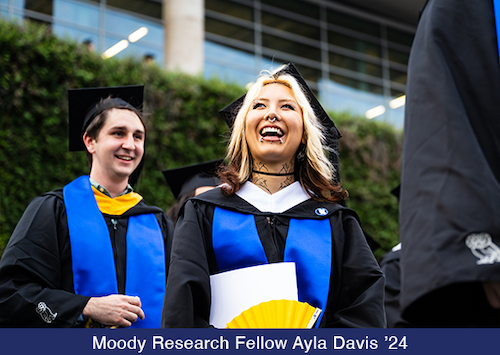
Moody Research Fellows
Art major Ayla Davis ’24, who specialized in documentary filmmaking and graduated with distinction in creative works, used her Elizabeth Lee Moody Undergraduate Research Fellowship in the Humanities and the Arts to complete “The Idea of Never,” a heartfelt documentary that spotlights her older sister’s challenges living with a hearing disability. Watch the full documentary.
Siddhant Patil ’25, an aspiring physician majoring in Religion and Kinesiology, has immersed himself in various religious studies courses, delving into the interplay between religious beliefs, rituals and cultural landscapes within the context of health care. As a Moody Research Fellow, he was able to travel to Sierra Leone and shadow the work of the Southern Eye Institute. Through this experience, he contemplated the nuanced role of spirituality in the process of healing and the diverse approaches to health and well-being found across different faith traditions.
As a Moody fellow, Rijuta Vallishayee ’24 cherished the opportunities that the fellowship affords for engaging in intellectual exchanges with faculty and esteemed scholars. In these moments, she found inspiration and validation in her chosen field. “Getting the fellowship is really an affirmation that what you’re doing is important,” said Rijuta, a History and Transnational Asian Studies double major who heads next to the University of California, Berkeley, for her doctoral studies. “Rice is very STEM-research oriented, so letting humanities students know that what they’re doing is important is essential.”
Meet all of our Moody Research Fellows.
NEW APPOINTMENTS
On July 1, 2024, we welcome the following faculty:
FACULTY
Amy Berg (PhD, University of California, San Diego, 2015), whose scholarly expertise and teaching portfolio include ethics, ethics and technology, social and political philosophy, feminist philosophy, philosophy of law and history of ethics, joins us from Oberlin College as an assistant professor in the Department of Philosophy.
Judith Brunton (PhD, University of Toronto, 2022) joins us as an assistant professor in the Department of Religion following a postdoctoral fellowship at Harvard. Her research interests include oil, religion, ethnography of contemporary spirituality, extraction, ongoing and legacies of colonialism, ecology, land, technology, infrastructure, ruins and the North American West.
Michael Dango (PhD, University of Chicago, 2017), whose research and teaching focuses on 20th- and 21st-century American culture, aesthetics, queer and feminist theory, and the environmental humanities, joins us from Beloit College as an associate professor in the Department of English with an affiliation and teaching commitment in the Center for the Study of Women, Gender and Sexuality.
Eve Dunbar (PhD, University of Texas at Austin, 2004), whose research interests include African American literature (late-19th to mid-20th century), Black feminist thought and art, African Diaspora and Black internationalism, joins us from Vassar College as a professor in the Department of English.
Caroline Fache (PhD, Indiana University, Bloomington, 2007), hails from northern France and joins us from Davidson College as an associate professor of French Studies in the Department of Modern and Classical Literatures and Cultures. Her research focuses on modern Francophone literature, cinema and the construction of identity in France for immigrants.
Chin Jou (PhD, Princeton University, 2009), whose research interests include medical humanities, in particular 20th-century U.S. history, food studies and carceral studies, joins us from the University of Texas at San Antonio to teach the history of medicine in the Program in Medical Humanities and will hold an appointment as an associate professor in the Department of History.
Devin Mays (MFA, University of Chicago, 2016), an artist who previously held a fellowship in the humanities and the arts through Rice’s Center for Engaged Research and Collaborative Learning (CERCL), will remain at Rice as an assistant professor in the Department of Art.
Hayley O’Malley (PhD, University of Michigan, 2020), whose interdisciplinary research and teaching focus broadly on African American literature, film and visual culture, with a particular emphasis on Black feminist art and activism since the 1960s, joins us from the University of Iowa as an assistant professor in the Department of Art History.
Benjamin Parris (PhD, Johns Hopkins University, 2013), who works at the intersections of early modern literature, critical theory, and the histories of philosophy and science, joins us from the University of Pittsburgh as an assistant professor in the Department of English.
Paula Park (PhD, University of Texas at Austin, 2014) joins us from Wesleyan University as an associate professor of Latin American Studies in the Department of Modern and Classical Literatures and Cultures. Her research and teaching interests are Latin American literature/culture and Philippine literature in Spanish and English from the 20th century. She focuses on exile writers, Orientalism, Asian diasporas and transpacific studies.
Nandi Theunissen (PhD, Columbia University, 2012), who is interested in foundational questions about the good and thinking about the value of humanity, joins us from the University of Pittsburgh as an associate professor in the Department of Philosophy.
Carly Thomsen (PhD, University of California, Santa Barbara, 2014), an interdisciplinary scholar of feminist and queer theory, joins us from Middlebury College as an associate professor in the Department of English with an affiliation and teaching commitment in Center for the Study of Women, Gender and Sexuality, where she was a postdoctoral fellow from 2014-2016.
Susannah Wright ’18 (PhD, Harvard University, 2024), whose research interests include epic poetry and its reception, including medieval vernacular adaptations; grief and gender in Greece and Rome; late antique Latin poetry, especially biblical epic; intertextuality and reception; and translation theory and practice, joins us as an assistant professor of Classical Studies in the Department of Modern and Classical Literatures and Cultures. She received her B.A. at Rice with a double major in Classical Studies and Medieval and Early Modern Studies.
Chang Xu (PhD, Washington University in St. Louis, 2024), whose research interests include the history of medicine, military history and imperial history, joins us from Washington University in St. Louis as an assistant professor in our Department of Transnational Asian Studies.
On Jan. 1, 2025, the following faculty will join us:
Azucena Castro (PhD, Stockholm University, Sweden, 2020), whose research combines environmental and energy humanities, posthuman geography, socio-ecological research, and Latin American cultural studies, will join us from Stanford University, where she is currently a postdoctoral fellow, as an assistant professor of Latin American Studies in the Department of Modern and Classical Literatures and Cultures.
Matthew Schneider-Mayerson (PhD, University of Minnesota, 2013), whose research combines literary criticism with communication studies and qualitative sociology to examine the cultural and political dimensions of climate change, with a focus on climate justice, returns to Rice from Colby College. Schneider-Mayerson will join us as an associate professor in the Department of English with an affiliation and teaching commitment to the Center for Environmental Studies. He was a Cultures of Energy Postdoctoral Fellow from 2013-2015 in the center’s predecessor, the Center for Energy and Environmental Research in the Human Sciences at Rice.
LECTURERS
On July 1, we welcome the following lecturers:
Teresa Bruno-Niño (PhD, Syracuse University, 2022), whose research focuses on well-being (what is intrinsically good for us) and ill-being (what is intrinsically bad for us), as well as philosophy of law and feminist philosophy, joins us from Pennsylvania State University as a lecturer for the Program in Politics, Law and Social Thought with an appointment in the Department of Philosophy.
Rosa Boshier Gonzalez (MFA, California Institute of the Arts, 2018), a writer and editor-in-chief of Gulf Coast Journal who is pursuing a PhD in Creative Writing and Literature at the University of Houston, join us as a lecturer in Creative Writing in the Department of English while Bryan Washington, assistant professor of Creative Writing, is on leave.
Matty Hemming (PhD, University of Pennsylvania, 2024), whose research is situated at the intersection of Black feminism, feminist and queer literary studies, and the medical humanities, joins us from the University of Pennsylvania as the inaugural Janice G. Doty Lecturer in Medical Humanities. This lectureship was created with a gift from Stephen Doty ’60 in memory of his late wife, Janice Doty ’60, a former member of our Humanities Advisory Board, Rice’s Board of Trustees and Association of Rice Alumni’s executive board.
Clinton Williamson (PhD, University of Pennsylvania, 2022), who researches the relationship between resistances to work and communistic poiesis in 19th- and 20th-century American literature and culture, joins us from Boston University as a lecturer in the Department of English.
POSTDOCTORAL FELLOWS
On July 1, we welcome the following fellows:
Anzi Dong (PhD, Arizona State University, 2024), whose research focuses on the lived experiences of Chinese migrant women of rural communities, in particular, their collective empowerment and capacity building, joins us from Arizona State University as a postdoctoral fellow in the Center for the Study of Women, Gender and Sexuality.
Steven Gubka (PhD, University of Texas at Austin, 2022), whose research interests focus on emotions and questions at the intersection of ethics, epistemology and technology, joins us from Florida Atlantic University as a postdoctoral fellow in the Ethics of Technology in the Humanities Research Center with an affiliation with the Department of Philosophy.
Ayodeji Olugbuyiro (PhD, Ohio State University, 2023), whose research interests include Luso-Afro-Brazilian studies, comparative African Diaspora studies, Afro-Portuguese literature and Yoruba Diaspora studies, joins us from the University of Chicago as the inaugural Dr. Anthony B. Pinn postdoctoral fellow in the Center for African and African American Studies. The fellowship was established with a gift from Terrence Gee ’86, a member of the Humanities Advisory Board and the Rice Board of Trustees, and his wife, Terri.
Vic Overdorf (PhD, Indiana University, Bloomington, 2023), whose research focuses on the intersection of queer lives and institutional violence with a particular focus on the role of the prison as a significant site through which these encounters occur historically, joins us from Butler University as a postdoctoral fellow in Gender and Science in the Humanities Research Center and the Center for the Study of Women, Gender and Sexuality.
Barnabas Ticha Muvhuti (PhD, Rhodes University, South Africa, 2023), an art historian and critic, educator and migration studies scholar, joins us as the new Nancy and Robert J. Carney postdoctoral fellow in the Department of Art History.
POST-MFA FELLOW
Ella Rosenblatt (MFA, California Institute of the Arts, 2024), a designer, artist, educator and writer, joins us from CalArts as a post-MFA fellow in Art and Digital Media in the Humanities Research Center and an affiliation with the Department of Art.
STAFF
On June 10, we will welcome the following staff member:
Christy Montecillo joins us as our new director of finance in the School of Humanities Dean’s Office. She comes to us from Texas Tech University, where she has served as an accountant and analyst and led teams responsible for managing financial aid and scholarships.
We welcomed the following staff earlier this academic year:
Karin Austin joins the Department of Religion as project manager for the Archives of the Impossible, a collection of accounts in the Woodson Research Center detailing the paranormal. Austin, who previously served as executive director of the John Mack Institute, described the gift of the John Mack archives to Rice at last year’s Archives of the Impossible conference.
Althea Carlson is the new administrator for both the Center for the Study of Women, Gender and Sexuality and for the Program in Medical Humanities.
Melissa Cohen-Nickels is the new curator of the Joan and Stanford Alexander South Texas Jewish Archives, a collaboration between our Program in Jewish Studies and the Woodson Research Center, where the archive is housed. She previously served as program administrator of the archive.
Julie Law is the new program administrator for the Department of Transnational Asian Studies and the Chao Center for Asian Studies.
Kelly McKisson ’23 is the new managing editor of Studies in English Literature 1500-1900, a quarterly journal of historical and critical studies. She previously served as editorial assistant and copyeditor at the journal.
Cindy Pereira is the new program administrator for the departments of Philosophy and Religion.
Kim Vera is the new program administrator for the Center for Languages and Intercultural Communication.
HUMANITIES RESEARCH CENTER NEWS
The Humanities Research Center — a hub for innovative and collaborative inquiry — is leading a series of conversations that mobilize interdisciplinary humanities and arts research to understand, challenge and reimagine the idea of “repair.”
In April, Graham Bader, director of the HRC and professor of Art History, moderated the first repair conversation, a lively exchange with Alexander X. Byrd ’90, Rice’s vice provost for Diversity, Equity and Inclusion, and associate professor of History; Lacy M. Johnson, associate professor of Creative Writing and director of undergraduate studies in the Department of English; and Samuel Reis-Dennis, assistant professor of Philosophy and Medical Humanities and director of graduate studies in the Department of Philosophy. All emphasized the importance of transformation and acknowledgement when thinking about repair, whether it be in the medical field, ecological and environmental studies, personal histories, or on the Rice campus itself. Join the HRC Sept. 20 for its next event in this series, a keynote lecture by award-winning writer, poet and scholar Maggie Nelson.
The HRC has awarded the following faculty fellowships during 2024-2025, with the goal of facilitating the initiation, completion or development of research projects:
Alden Sajor Marte-Wood
Assistant Professor, Department of English
Project title: Reproductive Reading: Overseas Filipina Writers in the World-Literary System
Maya Soifer Irish
Associate Professor, Department of History
Project title: The Politics of Persecution in Medieval Spain: Toward the Anti-Jewish Riots of 1391
The HRC hosts other faculty fellowships, including the Vice President for Research Fellowships, awarded through the Dean of Humanities Office in conjunction with the HRC.
Congratulations to the following 2024-2025 fellows:
Sarah Ellenzweig
Associate Professor, Department of English
Project title: Dryden in Time: Criticism, Translation, and the Counter-Classical Imagination at the End of the Seventeenth Century
Sophie Esch
Associate Professor, Department of Modern and Classical Literatures and Cultures
Director, Center for Latin American and Latinx Studies
Project title: Creaturely Cold War: More-Than-Human Narratives of Revolution and War in Africa and Latin America
Gordon Hughes
Associate Professor, Department of Art History
Project title: Seeing Red: Murder, Monstrosity, Law (from Hogarth to Sickert)
Congratulations to Michael Schwarz, the HRC’s postdoctoral fellow in law, political thought and the humanities, who has accepted a tenure-track philosophy position at Emory University.
FACULTY DISTINCTIONS AND RECOGNITION
Martin Blumenthal-Barby, professor of German and Film Studies in the Department of Modern and Classical Literatures and Cultures, and co-director of the Program in Cinema and Media Studies, has written his latest book, Cinema and Surveillance: The Asymmetric Gaze.
Claire Branigan, a lecturer in Spanish and Latin American Studies in the Department of Modern and Classical Literatures and Cultures, co-edited a new book titled Towards a Future without Femicide.
Douglas Brinkley, the Katherine Tsanoff Brown Professor of Humanities in the Department of History, has co-authored a new book that documents coal mining communities in postwar America. American Coal is a collection of 100 recently discovered images from photojournalist Russell Lee.
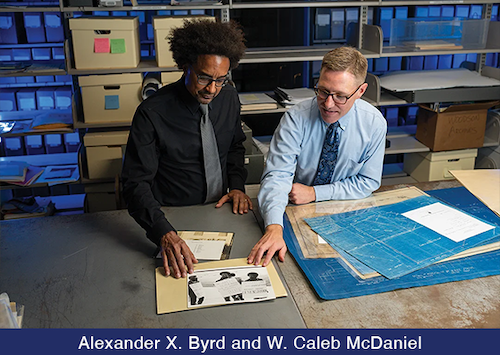
Alexander X. Byrd ’90, vice provost for Diversity, Equity and Inclusion, and associate professor of History, and W. Caleb McDaniel, the Mary Gibbs Jones Professor of Humanities and professor of History, sat down with Rice Magazineto reflect on the project they guided for the past four years, the university’s Task Force on Slavery, Segregation and Racial Injustice. See “Looking Back to Look Forward” as they discuss their research on Rice’s founding and desegregation.
Joseph Campana, the William Shakespeare Professor of English and director of the Center for Environmental Studies, has published his latest monograph, Shakespeare's Once and Future Child: Speculations on Sovereignty. Next year, on sabbatical, he will be a fellow at Dumbarton Oaks, a research institute in Washington, D.C., where he will work on a new project, “Scales of Nature: Thinking with Bees in Early Modernity.” With his collaborator, Rice’s Shepherd School of Music composer Kurt Stallmann, he has been awarded an artist residency at the UCross Foundation to prepare for a 2025 performance of “The Chapel in the Hive,” a collaborative work funded by the Yale Institute for Sacred Music’s “Religion, Ecology and Expressive Culture” program.
G. Daniel Cohen, the Samuel W. and Goldye Marian Spain Associate Professor in the Department of History, was awarded the Sir Peter Ustinov Guest Professorship at the University of Vienna for the spring semester.
Leo Costello, associate professor and chair of the Department of Art History and co-director of the Program in Museum and Cultural Heritage, co-curated the exhibition Raymond Mason: To Speak of Everything at the New York Studio School.
Luis Duno-Gottberg, the Lee Hage Jamail Professor in Latin American Studies in the Department of Modern and Classical Literatures and Cultures, co-curated an exhibition in Havana, Cuba, called “La Furia del Viento,” which showcased 120 years of photography depicting earthquakes and hurricanes.
Farshid Emami, assistant professor of Art History, published Isfahan: Architecture and Urban Experience in Early Modern Iran, a book that offers a new narrative of the architecture and urbanism of 17th-century Isfahan, the Safavid capital, through the analytical lens of urban experience.
Sophie Esch, associate professor in the Department of Modern and Classical Literatures and Cultures and director of the Center for Latin American and Latinx Studies, edited the book Central American Literatures as World Literature.
Julie Fette, associate professor of French Studies in the Department of Modern and Classical Literatures and Cultures, was named chevalier in the Ordre des Palmes académiques (French for “knight” in the Order of the French Academic Palms), an honor bestowed by the French Ministry of National Education. The consulate attributed the honor to a Fulbright grant Fette received in 2022 to study contemporary French children’s literature, among other work.
Denva Gallant, assistant professor in the Department of Art History, explores a deeper understanding of the intersection of visual culture and spirituality in medieval Italy in her new book. Illuminating the Vitae patrum: The Lives of the Desert Ascetics in Fourteenth-Century Italy is the first book to extensively examine the richly illustrated manuscript of the Vitae patrum housed at the Morgan Library and Museum in New York City.
Thimo Heisenberg, assistant professor in the Department of Philosophy, received a Humboldt Research Fellowship. He will use his fellowship to research the connection between 19th-century German philosophers and economic justice. Meanwhile, Sophie Esch, associate professor of Modern and Classical Literatures and Cultures and director of the Center for Latin American and Latinx Studies, is completing the third leg of her Humboldt fellowship. In her research, Esch examined narratives of war that explain in a more holistic way how war impacts multiple entities, not just humans. “The recognition of Thimo Heisenberg and Sophie Esch by the Alexander von Humboldt Foundation is a testament to their scholarly excellence and the global impact of their work,” said Ramamoorthy Ramesh, Rice’s executive vice president for research.
Leslie Hewitt, associate professor in the Department of Art, has her work Untitled (Where Paths Meet, Turn Away, Then Align Again) on display at the Menil Collection in Houston as part of its exhibition, "Abstraction After Modernism: Recent Acquisitions." She will also have her art on view at "Avant-Garde and Liberation — Contemporary Art and Decolonial Modernism," an exhibition this summer in Vienna, Austria.
Jeffrey J. Kripal, the J. Newton Rayzor Professor in Philosophy and Religious Thought in the Department of Religion, co-wrote Comparing Religions: The Study of Us that Changes Us with three former Rice doctoral students and one current student: Ata Anzali ’12, associate professor of Religion, Middlebury College; Andrea R. Jain ’10, professor of Religious Studies, Indiana University; Erin Prophet ’18, lecturer in Religion, University of Florida; and Stefan Sanchez, a PhD candidate in the Department of Religion. Kripal will use the textbook in the fall 2024 Big Questions course he is teaching, “What is Religion?”
Fabiola López-Durán, associate professor of Art History, finished a monographic book on the work of Venezuelan artist Magdalena Fernandez (forthcoming) and published a chapter in Brittany Utting’s book, Architectures of Care: from the Intimate to the Common.
Timothy Morton, the Rita Shea Guffey Chair of English, has been selected as a judge for the National Book Award in the nonfiction category. Morton, a prolific author of 25 books that have been translated 46 times in 19 languages, is tasked with evaluating roughly 120 submissions. See Rice News for more.
Brian Ogren, the Anna Smith Fine Professor of Judaic Studies and chair of the Department of Religion, received the Loewenstein-Wiener Fellowship to pursue research at the Jacob Rader Marcus Center of the American Jewish Archives in Cincinnati.
Kirsten Ostherr, the Gladys Louise Fox Professor of English and director of the Program in Medical Humanities and Rice’s Medical Humanities Research Institute, has been honored with the 2024 Health Humanities Visionary Awardby the Health Humanities Consortium. This recognition highlights her contributions to the field of medical humanities, where she has pioneered innovative approaches to understanding the human experience of health and illness through the lens of media studies, digital technologies and computational health.
Anthony Pinn, the Agnes Cullen Arnold Professor of Humanities and professor in the Department of Religion, has published two new books, The Black Practice of Disbelief: An Introduction to the Principles, History, and Communities of Black Nonbelievers and, with Peter Derkx, Meaningful Aging from a Humanist Perspective. This year, he was honored with the U.S. President’s Call to Service Award. The founding director of the Center for African and African American Studies and Center for Engaged Research and Collaborative Learning (CERCL), Pinn was recognized alongside CERCL colleagues at an event that featured a conversation between Pinn and hip-hop legend KRS-One. “This recognition underscores Rice’s deep-rooted commitment to social responsibility and civic engagement. Dr. Pinn’s leadership and the collective efforts of our dedicated colleagues serve as an example to us all, reinforcing our university’s mission to make a positive impact on our community,” Howard R. Hughes Provost Amy Dittmar said.
Sonia Ryang, the T.T. and W.F. Chao Professor of Asian Studies in the Department of Transnational Asian Studies, was awarded the University of California Berkeley Hong Yung Lee Book Award in Korean Studies for her book Language and Truth in North Korea.
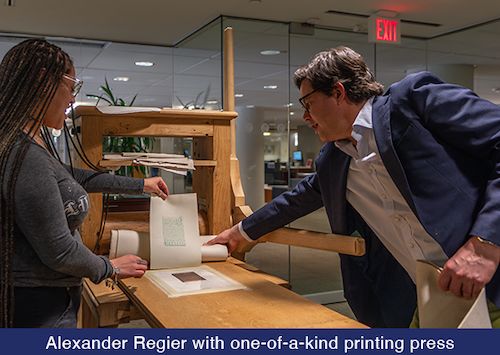
Alexander Regier, the William Faulkner Professor of English, chair of the Department of English, and a professor in the Department of Modern and Classical Literatures and Cultures, led the charge to bring a rare replica of poet William Blake’s star-wheel rolling press to Rice. Now, in collaboration with the Woodson Research Center, he is providing students in his classes a hands-on experience using the historically accurate printing press.
Casey Schoenberger, a lecturer in the Department of Transnational Asian Studies, has published his first monograph, Music, Mind and Language in Chinese Poetry and Performance: The Voice Extended, which uses insights from cognitive neuroscience, digital humanities, musicology and linguistics to offer an overview of the interwoven histories of traditional Chinese poetry and performing arts.
John Sparagana, the Grace Christian Vietti Professor of Visual Arts and chair of the Department of Art, held a solo exhibition, Reviver, featuring new works. This was Sparagana’s fifth solo show with the Chicago art gallery Corbett vs. Dempsey.
Kenneth Tam, assistant professor in the Department of Art, has held exhibitions at the Wattis Institute for Contemporary Arts (Absolute Memory: An Archive of Softness), at Tufts University Art Galleries (Standing in Soft Formation, which featured two of his projects together: Silent Spikes and The Founding of the World); and at Stanford University’s Cantor Arts Center (All of M). As an ALL ARTS artist in residence, he created an experimental documentary, Driver Brother.
UNIVERSITY AWARDS
We extend our warmest congratulations to the following School of Humanities faculty for their teaching awards.
The George R. Brown Award for Superior Teaching was awarded to:
- Peter C. Caldwell, the Samuel G. McCann Professor of History and director of the Program in Politics, Law and Social Thought;
- Esther Fernández, associate professor of Modern and Classical Literatures and Cultures.
Alden Sajor Marte-Wood, assistant professor of English, received the Sarofim Professor for Distinguished Teaching in the Humanities.
We are also proud to announce that Sophie Esch, associate professor in Modern and Classical Literatures and Cultures and director of the Center for Latin American and Latinx Studies, received the Charles W. Duncan Jr. Achievement Award for Outstanding Faculty.
Congratulations as well to:
Christine Gocek Medina, lead administrative specialist in the School of Humanities Dean’s Office, who was named an inaugural recipient of the Rice Staff Excellence Award.
SCHOOL OF HUMANITIES AWARDS
Best Doctoral Dissertation
A warm congratulations to Adrienne Rooney '23, who has received the John W. Gardner Award for Best Dissertation in the School of Humanities for her doctoral dissertation in the Department of Art History, “A Worldbuilding Moment: Aesthetics and Economics in the Caribbean Festival of Arts’ Revolutionary Era, 1966-1981.” Adrienne co-founded with Fabiola López-Durán, associate professor of Art History, Rice’s “Racial Geography Project,” an initiative of the Task Force on Slavery, Segregation and Racial Injustice. Today, she is a postdoctoral fellow at the Frederick Douglass Institute and in the Department of Black Studies at the University of Rochester.
Humanities Day undergraduate research and creative work showcase
We salute all the Rice undergraduates who participated in Humanities Day, our inaugural showcase of students’ intellectual curiosity and creative expression. The event featured oral and text-based presentations, including talks in English, French and Spanish, art and poster presentations, and a Medical Humanities practicum showcase and exhibit.
Congratulations to our Humanities Day awardees:
Rita Ajit, a double major in English and Social Policy Analysis, who was awarded Best Poster Presentation for a research project titled “The Enduring Authoritarian Regime of Hun Sen in Cambodia.”
Daniela Bonscher, a double major in History and in Latin American and Latinx Studies, who received the Humanities Research Center Award for Undergraduate Research Excellence for a project titled “Freedom Families on the Mexican Border: Texas Slavery and the Underground Railroad."
Tiffany Doan, a Health Sciences major, who received the Biggest Question Award for research titled "The Ignored — A Plea for a Home and Acceptance."
Tessa Domsky, a double major in Art History and in Visual and Dramatic Arts, who was awarded Best Creative Work for a project titled “Young Femininity.”
Rijuta Vallishayee, a double major in History and Transnational Asian Studies, who was awarded Best Oral Presentation for a research project titled "Performing Identity: Opera Bans as Qing Dynasty Governance of Social Identity.”
STUDENT RESEARCH AND ACHIEVEMENTS
Student-driven research into “The Red Book” is helping researchers to delve deeper into Black middle- and upper-class life in Houston in the early 20th century. Georgia Jensen, who is double majoring in History and Sociology, and Allison Bullock, a History major, meticulously extracted names and addresses from the 1915 book and used them to create a digital geospatial map containing more than 900 entries and extended biographies. The students’ work culminated in a panel discussion they led as part of the Black Houston(s) Symposium titled “Voices of The Red Book: A Window into Black Houston’s Past,” which featured descendants of people mentioned in this rare treasure.
Hoang Nguyen ’24 and Loic Duggal ’25, drawing materials from the Houston Asian American Archive and working under the guidance of Sidney Lu, the Annette and Hugh Gragg Associate Professor in the Department of Transnational Asian Studies, created an exhibit at the Houston Public Library on the history of Japanese rice farmers in Texas. The exhibition won the 2024 Texas Digital Library Trailblazer Award. This digital humanities project by Nguyen, who triple majored in Asian Studies, History and Political Science, and Duggal, who is majoring in Mechanical Engineering and minoring in Asian Studies, can be found on the HAAA website.
Congratulations to Lee Waldman, a rising senior double majoring in the Study of Women, Gender and Sexuality and in Sociology, who has been awarded a Truman Scholarship, the premier graduate fellowship in the United States for those pursuing careers as leaders in public service. See Rice News for more.
ALUMNI AWARDS
Congratulations to Melissa Kean ’96, ’00, who received the Association of Rice Alumni’s highest honor, the Gold Medal Award, at its 2024 Laureates Awards ceremony. Kean, who earned her master’s and doctorate degrees from the Department of History and then became Rice’s historian, was three credit hours shy of completing her master’s degree at Creighton University when she moved to Houston in the early 1990s. After enrolling in a southern history course with John Boles ’65 for transfer credit, Boles urged her to pursue a PhD and became her advisor. Kean's dissertation on the desegregation of five major southern universities, including Rice, was named the best in the humanities and later became a published book.
Olivia Wolf ’18 received both the National Endowment for the Humanities and the American Council of Learned Societies fellowships this year. Wolf, who received her doctorate from the Department of Art History at Rice, will use the awards to support writing a book project, which is based on her dissertation, “Migrant Constructions and Mahjar Monuments: Transnational Art and Architecture in Modern Argentina, 1910-1955.”
John M. Crum ’23, who received his doctorate from the Department of History, has been named runner-up for the Allan Nevins Prize of the Society of American Historians. He was recognized for his dissertation, "Headwaters of Empire: Landscapes of Power and Refuge in the Tennessee Valley, 1794-1870."
ALUMNI SPOTLIGHT
Ray Isle ’86 is one of the best-known wine writers in the country and among the top wine writers in the world. His path to executive wine editor for Food & Winemagazine was hardly a direct one. Born and raised in Houston, where his father, Walter W. Isle, taught literature in our Department of English and co-founded the Environmental Studies curriculum, Isle always knew he wanted to be a writer — he just thought it would be as a novelist. After earning a B.A. in English at Rice, Isle studied creative writing at Boston University, then got an offer from family friend and Pulitzer-winning author Larry McMurtry ’60 to work in his Washington, D.C., rare books store. While there, a waitress he was dating started bringing him bottles of wine to try, and his interest in wine took hold. See Rice Magazine for more about “The Wine Writer.”
The second book from Wesley Phelps ’10, who earned his doctorate from our Department of History and a graduate certificate from the Center for the Study of Women, Gender and Sexuality, sheds light on the 136-year journey leading to the landmark Supreme Court decision that overturned anti-sodomy laws across the United States in 2003. He spoke about the award-winning book, Before Lawrence v. Texas: The Making of a Queer Social Movement, at CSWGS’ Graduate Colloquium Lecture earlier this year, during which he was honored with the center’s Distinguished Alum Award. See Rice News for more.
FACULTY PROMOTION
We are pleased to congratulate Eric Huntington on his appointment to associate professor in the Department of Transnational Asian Studies.
LEADERSHIP IN THE SCHOOL
We thank Rosemary Hennessy, the L. H. Favrot Professor of Humanities, for returning on July 1 as Department of English chair on an interim basis while Alexander Regier, the William Faulkner Professor of English and chair of the Department of English, is on leave.
EVENT HIGHLIGHTS
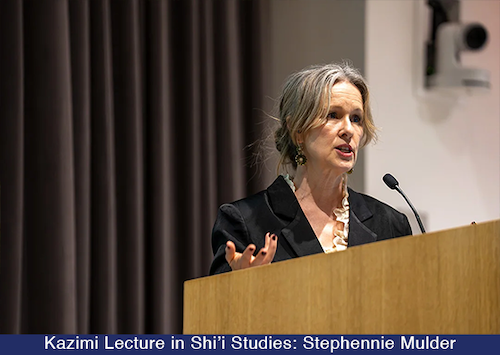
Kazimi Lecture in Shi’i Studies
University of Texas at Austin art history scholar Stephennie Mulder linked Sunni and Shi’i architectural heritage during the School of Humanities’ fifth annual Kazimi Lecture in Shi’i Studies. Drawing from her book The Shrines of the ’Alids in Medieval Syria, Mulder challenged the notion of inherent sectarianism in Islamic history, advocating for a more detailed perspective characterized by pragmatic cooperation. See Rice News coverage and a video of her talk.
Scientia / De Lange Conference
Luis A. Campos, the Baker College Chair for the History of Science, Technology and Innovation, associate professor of History and incoming co-director of the Program in Science and Technology Studies, chaired Rice’s De Lange conference this year. Themed “Brave New Worlds: Who Decides? Research, Risk and Responsibility,” the conference featured an array of distinguished speakers, artists and researchers who discussed timely technological and environmental topics. Humanities faculty speakers included Jeffrey J. Kripal, the J. Newton Rayzor Professor of Philosophy and Religious Thought; Kirsten Ostherr, the Gladys Louise Fox Professor of English and director of the Medical Humanities Program and Rice’s Medical Humanities Research Institute; Joseph Campana, the William Shakespeare Professor of English and director of the Center for Environmental Studies; Robert J. Howell, the Yasser El-Sayed Professor and chair of the Department of Philosophy; and Elizabeth Petrick, associate professor of History and co-director of the Program in Science and Technology Studies.
Women’s History Month lecture
Alison Kafer, director of LGBTQ studies, the Embrey Associate Professor of Women’s and Gender Studies, and associate professor of English at the University of Texas at Austin, presented “Disability and Reproductive Justice” at the Women’s History Month lecture. The annual event, organized by Fay A. Yarbrough '97, the William Gaines Twyman Professor of History and associate dean for the Humanities, is sponsored by the Department of History and Center for the Study of Women, Gender and Sexuality with support from the School of Humanities Dean’s Office. See Rice News coverage.
Rice Global Paris Center symposium
Daniel Domingues da Silva, associate professor of History, organized a symposium at the Rice Global Paris Center titled “Hidden Archives of Capitalism and Slavery in the Indian Ocean: State, Business, and Personal Collections.” The symposium was part of a National Endowment for the Humanities (NEH) grant to expand the geographic coverage of SlaveVoyages, the world’s largest database on the history of slave trade, which is housed at Rice.
Ethics and Compliance Symposium
Jacqueline Couti, the Laurence H. Favrot Professor of French Studies and chair of the Department of Modern and Classical Literatures and Cultures, and Luis A. Campos, the Baker College Chair for the History of Science, Technology and Innovation, and associate professor of History, spoke at Rice’s second annual Ethics and Compliance Symposium, Countries and Context: Research Ethics in a Global Age. During her presentation titled “Ethics and (Re)presentation in a Global World,” Couti explored the representation of black women’s bodies in the colonial writings of Médéric Louis Élie Moreau de Saint-Méry (1750-1819), a French official and lawyer known for his texts on Saint Domingue (now Haiti) and Martinique. Campos focused on the International Congress on Recombinant DNA Molecules, held at the Asilomar Conference Center in Pacific Grove, California, in 1975. He discussed the legacy of this event, which continues to be invoked in discourse surrounding questions of research ethics, and the intersection of science policy and public interest.
“Foucault: Genealogies for the Future” conference
Niki Kasumi Clements, the Watt J. and Lilly G. Jackson Associate Professor in the Department of Religion, spearheaded an international conference on Michel Foucault’s influence, 40 years after his death. The conference was supported by the Creative Ventures Fund in Rice’s Office of Research, the Department of Religion’s Rockwell Fund and the School of Humanities, and co-sponsored by the Center for the Study of Women, Gender and Sexuality; the Humanities Research Center; the Medical Humanities Research Institute; and the Department of Modern and Classical Literatures and Cultures.
“Gravity is the Momentum of Feelings” talk
The Chao Center for Asian Studies and the Houston Asian American Archive hosted award-winning multidisciplinary artist, Xin Liu, whose sculptures, videos and virtual reality installations explore the impact and interplay of technology on the human experience. Liu used her month-long residency at the Houston Asian American Archive to incorporate the Asian American immigration experience into her work with AI. During her residency, she presented a public talk, “Gravity is the Momentum of Feelings.”
“Dzogchen and Tibetan Modernity” conference
Professor of Religion Anne C. Klein organized “Dzogchen and Tibetan Modernity,” a two-day international conference that was supported by the Department of Religion; Center for the Study of Women, Gender, and Sexuality; Chao Center for Asian Studies; Creative Ventures Research Fund; and Dawn Mountain, a Center for Tibetan Buddhism.
Artist-in-Dialogue discussion
Jacqueline Couti, the Laurence H. Favrot Professor of French Studies and chair of Modern and Classical Literatures and Cultures, moderated a discussion with Laure Prouvost as part of the Moody Center for the Arts Artist-in-Dialogue series. Joining the conversation were Couti’s colleagues, lecturers Claire Branigan, a cultural anthropologist, and Mary Grayson Brook, who teaches and researches 19th- and 20th-century German literature.
UPCOMING EVENTS
Launch Event
Wednesday, May 29
Virtual event celebrating the launch of Shakespeare’s Once and Future Child: Speculations on Sovereignty, a new monograph by Joseph Campana, the William Shakespeare Professor of English, and a special issue of Studies in English Literature, “World, Globe, Planet,” co-edited by Campana and Ayesha Ramachandran, associate professor of comparative literature at Yale University.
Learn more and register to receive your Zoom link.
Sponsored by the Department of English
Humanities Research Center lecture
Friday, Sept. 20
Fondren Library, Kyle Morrow Room
Speaker: Maggie Nelson
Maggie Nelson is the author of several acclaimed books of poetry and prose, including Like Love: Essays and Conversations, the national bestseller On Freedom: Four Songs of Care and Constraint, the National Book Critics Circle Award winner and New York Times bestseller The Argonauts, The Art of Cruelty: A Reckoning (a New York Times Notable Book of the Year), Bluets, The Red Parts, and Women, the New York School and Other True Abstractions. Her poetry titles include Something Bright, Then Holes and Jane: A Murder (Finalist, the PEN/ Martha Albrand Art of the Memoir). She holds a PhD in English literature from the City University of New York, and has taught literature, writing, art, criticism and theory at the New School, Pratt Institute, Wesleyan University, CalArts, and the University of Southern California, where she is a professor of English.
This keynote lecture is part of the Humanities Research Center’s two-year-long conversation that mobilizes interdisciplinary humanities and arts research to understand, challenge, and reimagine the idea of “repair.”
Families Weekend
Friday, Sept. 27 | Saturday, Sept. 28
Humanities NOW reading and conversation
Tuesday, Oct. 8
Join us for a reading by Andrea Bajani, professor in the practice in the Department of English and one of the most recognized and award-winning novelists of contemporary Italian and European literature, followed by a conversation with John Sparagana, the Grace Christian Vietti Professor of Visual Arts and chair of the Department of Art, whose work has been shown internationally, most recently with exhibitions in Los Angeles, Berlin, Chicago, Houston, New York, and Zürich.
Hosted by Natasha Bowdoin, School of Humanities associate dean and associate professor in the Department of Art, Humanities NOW conversations are open to all Rice students and the entire Rice community.
Alumni Weekend
Friday, Nov. 1 | Saturday, Nov. 2
School of Humanities Campbell Lectures
Tuesday, Nov. 12 | Wednesday, Nov. 13
Moody Center for the Arts, Lois Chiles Studio Theater
Speaker: Mel Chin
Mel Chin was born in Houston and is known for the broad range of approaches in his art, including works that require multidisciplinary, collaborative teamwork and works that enlist science as an aesthetic component to developing complex ideas. He created and implemented Revival Field (1990), a project that was a pioneer in the field of “green remediation,” the use of plants to remove toxic, heavy metals from the soil. From 1995-1998, he formed the collective the GALA Committee that produced In the Name of the Place, a public art project conducted on American prime-time television.
Mel Chin is one of the artists featured in the first year of the PBS Series Art of the 21st Century. His proposal for a New World Trade Center was part of the American representation at the 2002 Venice Biennale of Architecture. In 2017, his film, 9-11/9-11, won the Pedro Sienna Award for Animation in Chile. His ongoing Fundred Project addresses childhood lead-poisoning through art-making. In 2017, he founded S.O.U.R.C.E. Studio to both enlarge the dialogue and realize sustained engagements with community and environment. In 2018, he presented Unmoored and Wake in Times Square, New York City, creating a visual portal into a future of rising waters and concurrently he had a 40-year-survey exhibition at the Queens Museum, NYC, that Hyperallergic, the online arts magazine, named the best art exhibition of 2018. Chin is the recipient of many awards, grants, and honorary degrees, including the MacArthur Fellowship, 2019, and election to the American Academy of Arts and Letters in 2021.
The Campbell Lecture Series is organized by the School of Humanities Dean’s Office, with generous support from the Campbell Foundation. The mission of the series is to bring distinguished scholars in the arts, literature and humanities to Rice to discuss their work and career, while supporting engagement between scholar and student.
I look forward to seeing many of you in person when we return to campus in August. Until then, I extend a warm congratulations to all our graduates, offer my gratitude to our faculty and staff, and wish all of you good health this summer!

Kathleen Canning
Dean, School of Humanities
Andrew W. Mellon Professor of History
Rice University

